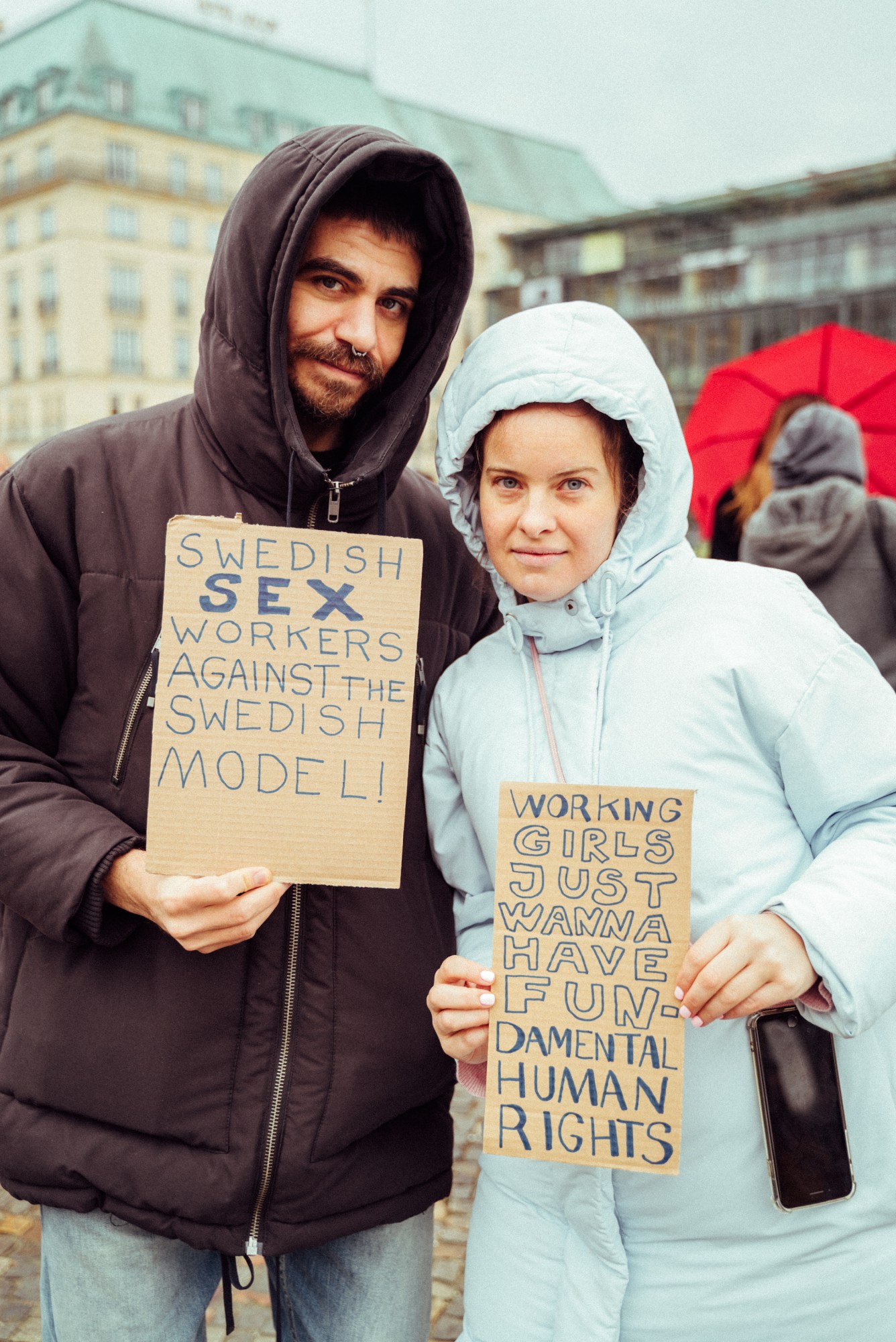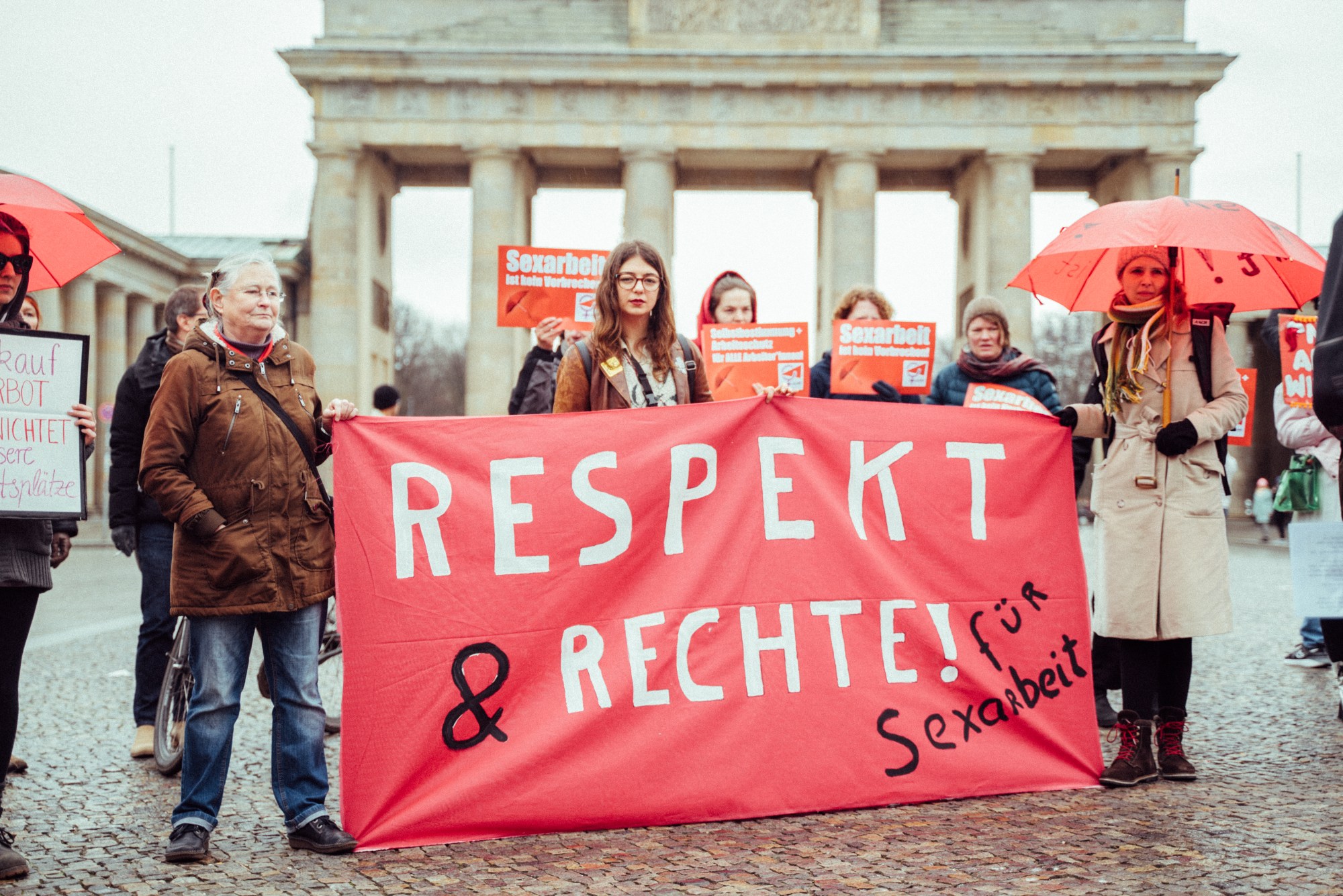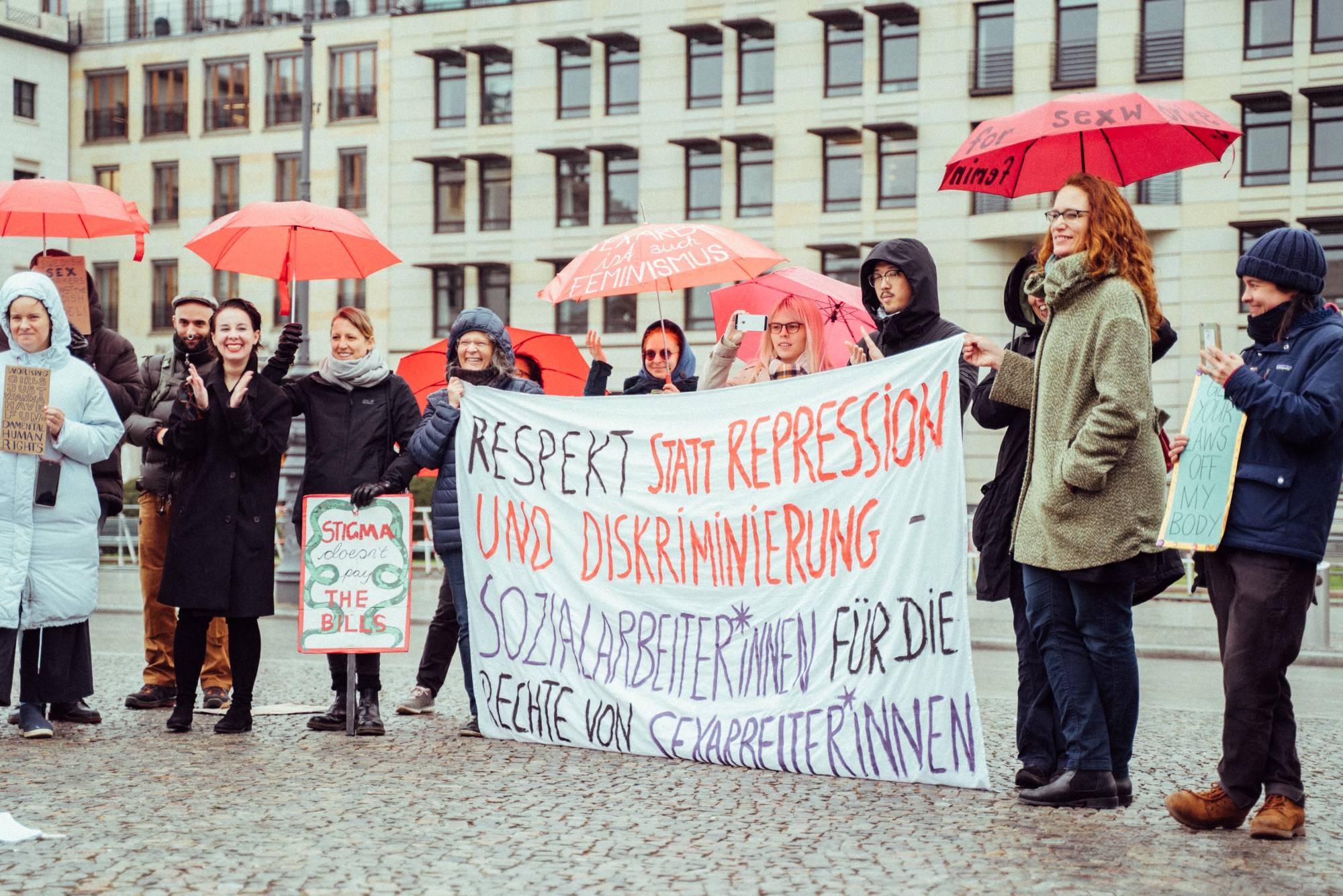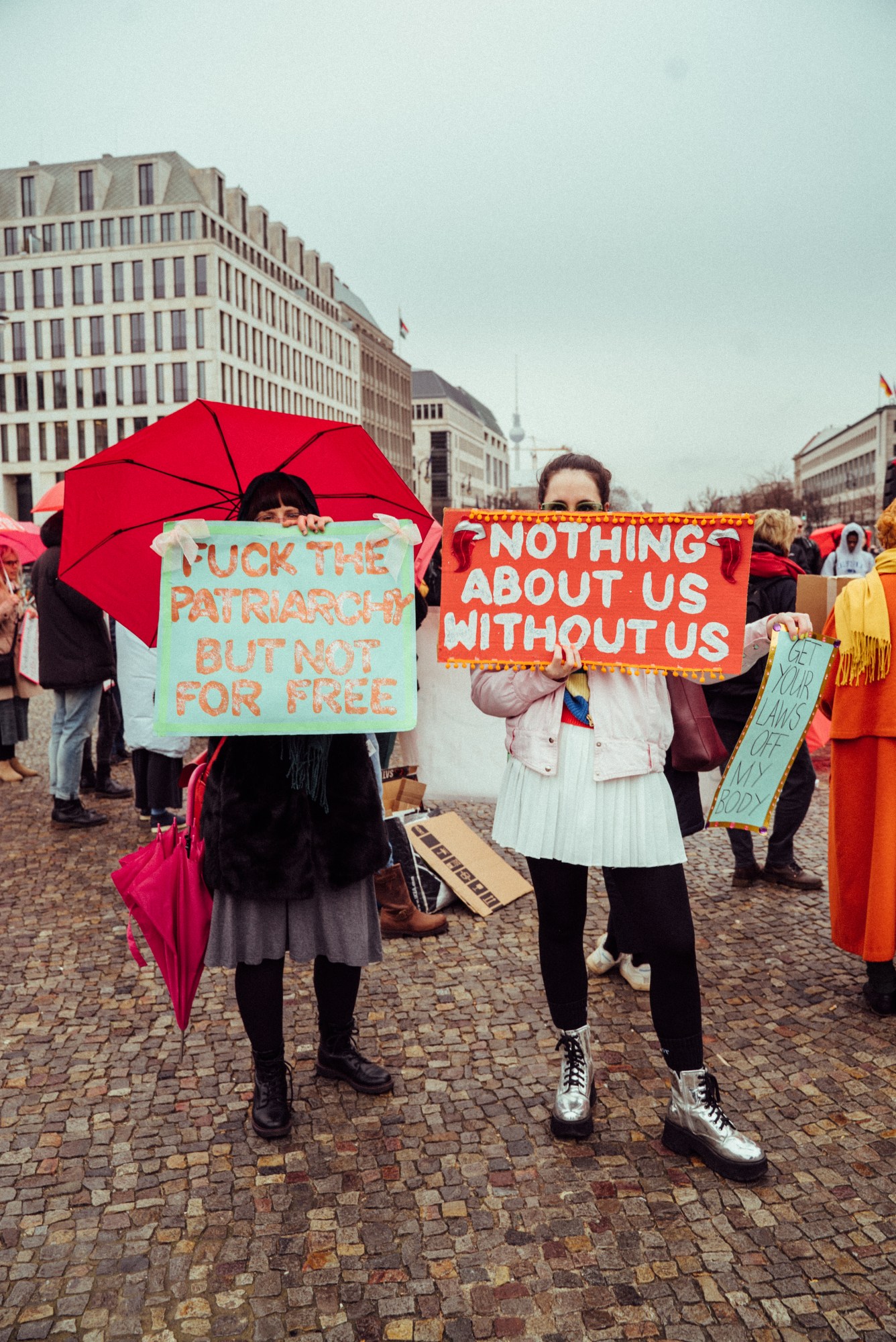Beneath a blanket of cloud in Berlin, Brandenburger Tor gets a much needed injection of colour. Red umbrellas prop up on Pariser Platz, the walkway at the foot of the historic Brandenburg Gate monument. A small group of protesters huddle together beneath them, holding signs carrying messages: “Fuck the patriarchy — but not for free!”; “No bad whores, just bad laws”. Tourists stroll past, gazing noncommittally. Some make a brief pitstop on their walking tour. Umbrellas arranged on the ground, at the centre of the protest, bear their own hand-written slogans: “Sexarbeit ist auch Arbeit!” (“Sex work is real work!”), and “My body my choice”.
They’re not just a simple shield for the afternoon rain; the red umbrella is a symbol of the sex workers’ rights movement. It was embraced following a 2001 protest during the 49th Venice Biennale, a parade of international sex workers hovering beneath a symbol of much-needed protection. The colour — a lascivious, stiletto red — calls to mind stereotypes long associated with the community. Today (3 March), protesters clutch their umbrellas for International Sex Workers Rights Day. It arrives at a pivotal point for sex workers in Germany. People here are speaking out against a looming threat to their rights, following reports the country is considering bringing in the so-called Swedish or Nordic model, essentially making it a criminal offence to purchase sex.
Ron Hades has been working as a Dom (a professional dominant as part of the sex industry) in Berlin for two years. He’s currently able to work legally in a studio in the city, and is registered as a sex worker in accordance with the Prostituiertenschutzgesetz (ProstSchG), the controversial German law which came into force 1 July 2017. Under that law, sex workers are required to register with a local authority and undergo mandatory counselling and health check-ups. The law was proposed with the aim of protecting sex workers, but the community here experience it differently. “The stigma for people is the big problem,” Ron says at the protest. “It’s just profiling, we need to put all our [details] down, and people can arrest us if we don’t have the right identification. It’s really unfair.”

According to sex workers, the law does little to improve working conditions and it fails to integrate sex work into existing labour law; to elevate their rights alongside those of other working people. “For me, even the idea of having the license just to be able to work, [in a profession] you don’t need a special skill to do, like a lawyer or doctor, is so bizarre,” Ron says. “We need to renew our license and do a health check every year. The whore ID [a colloquial term for a prostitute’s registration certificate], we need to renew every second year. The appointment, [asking me] about how I use a condom, how I protect myself, over and over again — it’s not practical. Most sex workers know about safe sex better than anyone else.”
The ProstSchG is known to be a bureaucratic nightmare for sex workers. That is, if they comply. As Aya Velázquez, a Berlin-based escort, anthropologist and startup founder tells me: “Many women did not register because they were scared the data could be leaked.”
While the current system has been criticised for further policing and marginalising sex workers, Aya is one of many concerned that the realities of sex workers in the city could soon get worse under the Swedish model, called for by abolitionist groups and some voices inside the Governmental Coalition between the CDU (conservatives) and the SPD (social democrats).

Currently in place in Sweden, Norway, Iceland, Northern Ireland, Canada, France, Ireland, and most recently, Israel, its central feature is total criminalisation of clients, not workers. Advocates frame the model as a shift in stigma from those who sell sex to those who buy it, putting emphasis on reducing the demand that drives sex trafficking. But it’s widely known to backfire on sex workers and escalate the threats to their work. “Imagine someone who owns a bakery, who can sell bread, but no one can buy what they sell,” Aya says. “The same logic applies to the proposed Swedish model. We fight it because it would destroy our business.”
“Bringing the law to Germany would be a serious infringement of sex workers’ rights,” Swedish-born, Berlin-based Miranda (a pseudonym) says. Timotheus, another sex worker who grew up in Sweden, speaks of the hostile climate created by the model — noting examples of people getting their children taken away from them, or losing apartments because the police have told landlords about their profession. “The argument for the Swedish model is that it doesn’t criminalise us, only the client,” Miranda says, “which is ridiculous because we get criminalised just by association. Even if the client gets arrested, they get a ticket, they have to pay a fine. [As a] sex worker, you’re at a crime scene. All of your stuff can be taken as evidence.”

While it’s a grave situation for all sex workers under the Swedish Model, the particularly harmful effects are felt by the most marginalised of sex workers, including migrant and trans sex workers. “The most affected,” Timotheus adds, “are people who are already on the margins, people who don’t have papers. A lot of the time the [government’s interpretation of] ‘rescue’ is to deport and not offer any help.”
Ron is quick to note his privileged position as a sex worker with a studio to work from, but tries his best to support those with less of a shield by protecting them from further persecution. He runs a safe hold group for other migrant sex workers in Europe, where he sees the existing ProstSchG impact some more acutely, failing to protect them from violence. “I organise an Asian sex worker group,” he says. “You can see it’s dangerous sometimes. Many work at home, or in a dangerous spot. No one would know if something happened to them — because of the law that you need to have an ID, they are so scared about calling the police even if they need to. They are also scared about their visa, that they can’t stay in Germany. You can register to work as a sex worker, but you cannot get a visa if you work as a sex worker. It’s totally hypocritical.”
Globally, attitudes toward sex work are strongly tied to issues of migration. For Salomé Balthus, an escort who grew up in Berlin, this idea takes on a new dimension today. She sees the proposed clampdown on sex workers’ rights as part of a wider problem of gentrification pushing minorities further to the fringes. Rent rises and intolerance grows as a result of “a self-called majority wanting to build a kind of Disney Deutschland, with their own moral ideas which won’t accept that people are different, people are loving different, and people have the right to be different.”

“I believe that Berliners were and still are very open minded and tolerant,” Salomé says. “Prostitution is a part of a big city. But [people who victimise sex workers] are often the same people who want to profit [from property] and who fight against migration. It’s important to realise this is a loud minority fighting against a multicultural city, against the poor, for the rich.”
Addressing the march today on behalf of Germany’s democratic socialist left party, Die Linke, is Doris Achelwilm, their speaker for gender equality, queer politics and media politics. “Sex workers need to be protected and not persecuted by these laws,” she says. “You have to speak with the sex workers and the organisations, and not just make legislation against their will. We have to listen and make legal decisions to make the lives of sex workers easier and not more difficult.”
As the march’s modest turn out dissipates and the Berlin grey regains its stronghold on the landscape, Ron stresses that he’s “not going to be able to work if the Swedish model comes to Berlin. No one will visit sex workers because they will get arrested.”
“If the Swedish Model comes,” Salomé adds, “our workplaces will be lost and it will be nearly impossible to work safely. [I feel] a mixture of fear and of enjoying company which could be gone soon. Like the last party before the curtain falls.”

Credits
Photography Carys Huws
Assistance Shauna Summers

